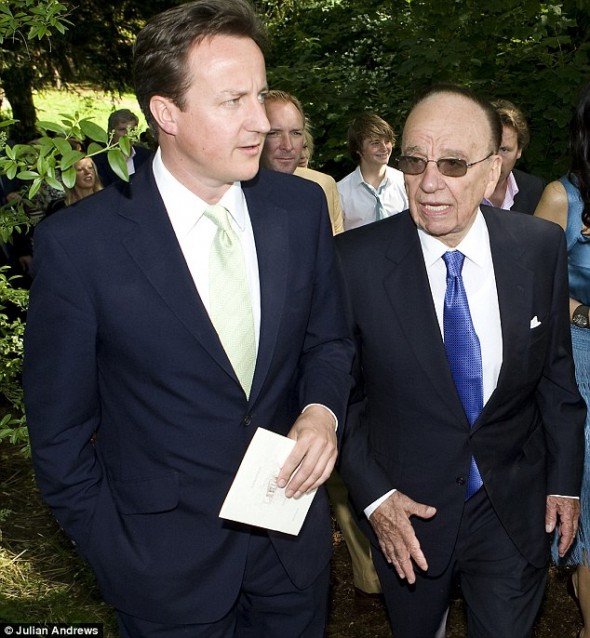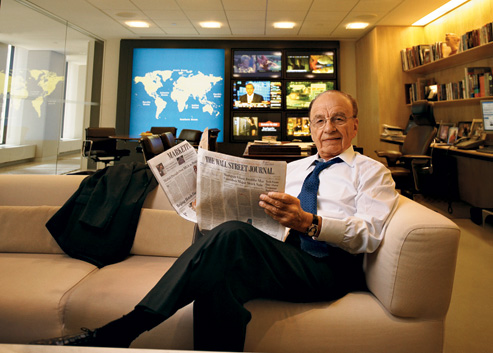THE MAN WHO OWNS THE NEWS: INSIDE THE SECRET WORLD OF RUPERT MURDOCH
By Michael Wolff 456 pages. Vintage Books. $15.70

Rupert Murdoch loves newspapers
Yes, he presides over a multi-billion media empire that includes television, publishing, tech, sports channels and a movie studio. But the one thing that animates him the most are the newspapers he has accumulated over the last 50 years of his career.
For a lot of people, in particular his shareholders, this is puzzling. For a man as successful and as shrewd a businessman as he is, why is he so enamored by an industry that by all accounts is in its death throes?
This is the central question that Wolff attempts to answer of Rupert Murdoch. In fact, the book chronicles his ultimately successful acquisition of one of the premier newspapers in the history of American journalism: The Wall Street Journal. It is through this chapter in Mr. Murdoch’s career that we come to gain some insights in what kind of leader he is and what is the driving passion of his life.
These three quotes from the book are key to understanding Murdoch and what animates him as a leader.
As Curious as a Cat
“He’s able to subjugate his own ego to the job at hand, what the people around [him] call, with great respect, his natural curiosity, but which is really an extreme, killed-the-cat kind of curiosity, the curiosity of a thief; he is not just interested but covetous, not just covetous but insatiable.”

In the early to mid-2000s, word starts circulating that some members of the Bancroft family, the clan that owns Dow Jones, publisher of the Wall Street Journal, are unhappy. While for years the family had been united in their conviction that their company was not for sale, lately some cracks started to reveal themselves. The conversation has not quite evolved to discussions over their future ownership of Dow Jones. Their dissatisfaction is rooted in the proverbial root of all evils: money.
Murdoch gets a wind of this and senses an opportunity. How? Through gossip. In the spring of 2005, he learns from Bruce Wasserstein, an investment banker, who in his attempt to get business from Murdoch, relays the whispers that the Bancroft family’s “ever increasing” financial needs are getting acute.
Here is Wolff’s observation of what that interaction meant:
“If you know anything…about doing business with Murdoch, you know you have to have gossip about something, have to hold out the possibility of unsettled relationships…of exploiting other people’s weaknesses…of far flung, unthought-of opportunities.”
Now, this does not mean that the man is interested in gossip for its own sake. For Murdoch he believes that knowledge is indeed power. And for him its not knowledge that comes from numbers, spreadsheets, pie charts or data, that informs the modern’s C.E.O’s way of doing business. He values knowledge about people, above all else. This, to him, is the most important currency of all in business. When negotiating or leading his company, he plays the man in front of him. Or as Wolff puts it, “[a] secret…of Murdoch’s success, the grease of his career is his ability to deal with, and prevail in, highly personal, profoundly emotional transactions in which the stakes are not just financial but deeply related to ego, turf and family.”
That explains why he loves tabloid journalism, the newspaper tradition that excels in the exposure of human foibles. Through an understanding of human weakness is how he makes the strategic decisions that have made him the most powerful media baron of the age.
Power is the Ultimate Currency
“He’s Nixonian in that sense – enjoyment does not seem to be a priority. He is just so clearly more interested in power than in things. He understands that the symbols of power – and this is not something necessarily so well understood by the rich and powerful – aren’t power, they are distractions.”

Wolff tells a story of how for years Murdoch never owned a private jet. It was never a question of whether he could afford it. The trappings of wealth have never been the driving force in his life. For Murdoch, the art of the deal, the power to shape events to his liking is what keeps him going.
As alluded to before, newspapers are, by all accounts, a bad business. So, why did he spend $5 billion to buy The Wall Street Journal in 2007? First, is the question of whether he can do it: Can he make the deal? It’s as if he likes to test his power through doing something radical and transformative. “It’s management by upheaval…or management by force of will – he makes his enthusiasms everybody’s enthusiasms. He changes the game so much that it stays his,” says Wolff.
Complimentary to this is the prestige and the influence that comes from owning one of the most recognizable brands in journalism. He enjoys the ability to shape events through the power of newspapers. Yes, legacy media may be dying, but they still wield enormous influence in the way history is shaped and remembered. Murdoch believes this. This is why he spent $5 billion to acquire the Journal in 2007. It was not because it is necessarily a profitable endeavor. Rather, for him, the ability to influence what people know is more powerful and therefore more valuable a pursuit.
The Insider-Outsider
“He’s the product of a nation whose artifice is lack of artifice, which inevitably comes into conflict with everybody’s else’s rituals and properties.”

Rupert Murdoch’s story is about an insider who views himself as the ultimate outsider. His father Keith, a newspaper proprietor in his own right, would socialize with Prime Ministers in Australia and the British upper class in London. He himself attended exclusive private schools and went to Oxford University for his undergraduate studies, that bastion of the establishment in British society.
Yet he has never thought of himself as part of the elite. This is never more pronounced than when in 1969 his News of the World, a British tabloid, serializes the memoirs of a certain Christine Keeler. Ms. Keeler was part of one of the most scandalous moments in British political life involving the defense secretary John Profumo. In the late 1960s, the latter had “rehabilitated” his image through his charity work and was now being viewed as a role model of British society. For Murdoch, this acceptance of Profumo struck him as a way to put embarrassing moments involving the elite under the rug. “Britain, to Murdoch, is ruled by a hypocritical, self-sustaining establishment,” writes Wolff. The decision to publish Ms. Keeler’s memoirs in his newspaper was his way of reminding them of that
This worldview also informs his approach in America. This explains the ethos of his most profitable media outlets in the country: The New York Post and Fox News. Reading the Post and watching Fox, one is continually struck by the positioning of both as the defender of the ordinary man against the ‘oppression’ of the powers that be. This is no accident. It is a reflection of the man who owns both outlets.
A Complex Figure
As a journalist, reading Wolff’s portrait, I couldn’t help but feel ambivalent about Rupert Murdoch. His love of newspapers has meant that he has invested significant capital in an industry at a time when cost cutting is the default position of most media organizations. Yet his motives do not necessarily appear to be always kosher. His appetite for power and the desire to leverage his media outlets for his business interests and the further entrenchment of his influence has been controversial.
Nevertheless, Rupert Murdoch remains a complex figure that continues to fascinate. And his leadership approach will remain something worth studying for years to come.
